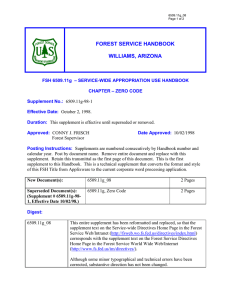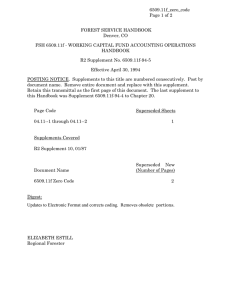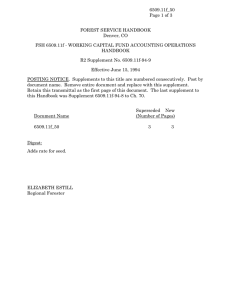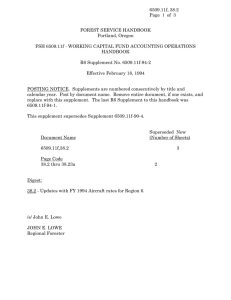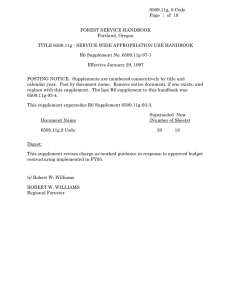6509.11g_zero_code Page 1 of 6 FOREST SERVICE HANDBOOK Denver, CO
advertisement
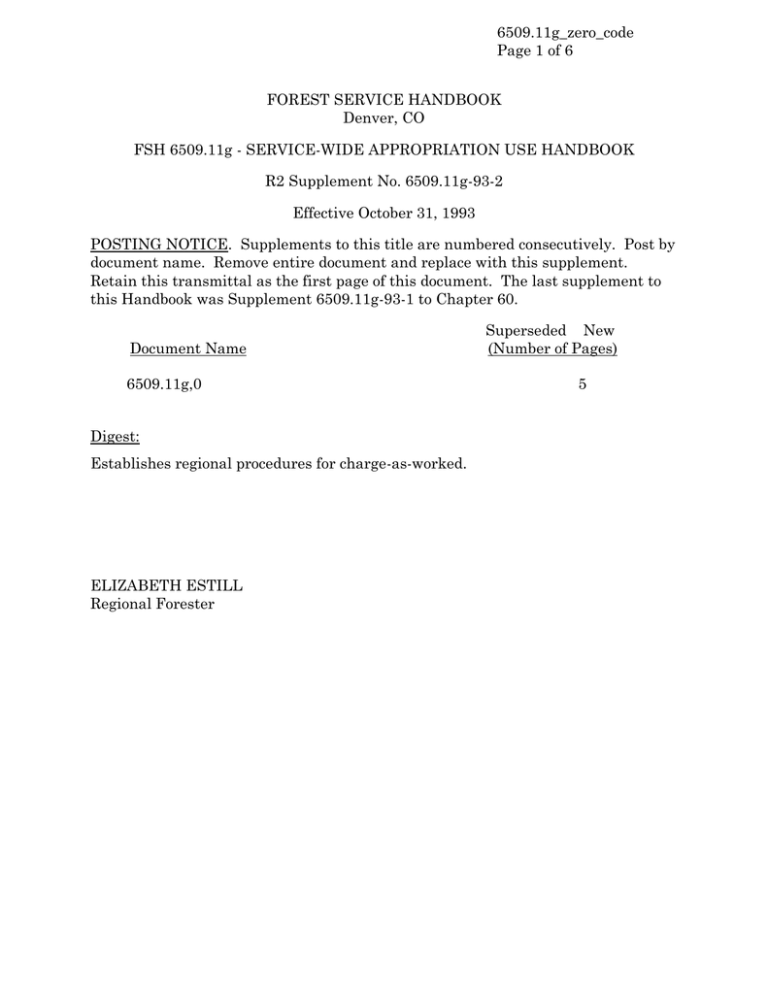
6509.11g_zero_code Page 1 of 6 FOREST SERVICE HANDBOOK Denver, CO FSH 6509.11g - SERVICE-WIDE APPROPRIATION USE HANDBOOK R2 Supplement No. 6509.11g-93-2 Effective October 31, 1993 POSTING NOTICE. Supplements to this title are numbered consecutively. Post by document name. Remove entire document and replace with this supplement. Retain this transmittal as the first page of this document. The last supplement to this Handbook was Supplement 6509.11g-93-1 to Chapter 60. Document Name 6509.11g,0 Digest: Establishes regional procedures for charge-as-worked. ELIZABETH ESTILL Regional Forester Superseded New (Number of Pages) 5 R2 SUPPLEMENT 6509.11g-93-2 EFFECTIVE 10/31/93 6509.11g_zero_code Page 2 of 6 FSH 6509.11g - SERVICE-WIDE APPROPRIATION USE HANDBOOK R2 SUPPLEMENT 6509.11g-93-2 EFFECTIVE 10/31/93 ZERO CODE 09 - FISCAL CONTROLS. 4. Charge-as-Worked Controls. The intent is to meet the "Charge-as-Worked" principle: that is, the accounting records must: a. Result in an accurate reflection of actual work performed. b. Provide comparable unit cost information, c. Result in proper accountability for reporting to Congress. Employees associated with creating, recording, or reporting transactions are to ensure that each transaction is charged to the benefitting fund codes and work activities. There are two aspects of this responsibility: (1) establishment of management codes in such a way that proper accounting can occur; and (2) charging expenditures to the correct management code. The responsibility of employees creating, recording, and reporting transactions is to charge the correct management code. The following are the minimum Regional standards and controls needed to meet charge-as worked principles. a. Management codes must reflect fund codes and work activities required for National/Regional reporting. b. Use of multi-line management codes are to be consistent with the examples provided in Item 6 of this Supplement. c. All expenses are to be charged to those benefitting funds/activities appropriate for the work performed. d. Salary time charged is to be in accordance with Item 5 of this Supplement. 5. Accuracy of Charges. Accuracy standards are as follows: a. Payroll Accuracy. This applies to all management codes which an individual may be budgeted from or works on. Record time on payroll or documentation back-up in 4 hour increments, unless more specific detail is needed locally. For example, this would be necessary where a person spends 1-2 hours everyday on a certain activity which would not get recorded using the strict 4-hour-rule application, i.e., small specific Cooperative Trust and reimbursable accounts, specific earmarked project funds and emergency unplanned activities. Use judgment in applying the 4-hour-rule principle. R2 SUPPLEMENT 6509.11g-93-2 EFFECTIVE 10/31/93 6509.11g_zero_code Page 3 of 6 b. Contract Accuracy. Follow parent direction. c. Equipment Use Accuracy. Equipment use costs may be managed in a number of ways, such as a separate management code for each vehicle or directly charged as used. Care must also be given to ensure that mileage chargeable to unique programs that could not be identified at the first of the year, and thus need "actual" mileage, are properly recorded to the appropriate management code(s). These are for areas such as fire suppression activity, reimbursable charges, etc. Forest-wide management codes for equipment use are not permitted in accordance with the Charge-as-Worked principle. d. Training Accuracy. Training, in general, is to improve present performance or enhance career development. Training salary costs (other than details as discussed in Item e below) shall be charged to the employees regularly budgeted funds. Basic fire training (S130, S190, S260), normally 24 hours or less, will be paid from employees regular work activities. Specialized fire training will be funded by presuppression. e. Cost of Details/Employee Development/Facilitators. This direction recognizes that many/most short-term details can be considered training, as many times they are beneficial to one's own job and do contribute to career development. In addition, the values on short-term details are insignificant in relation to the overall yearly costs. It also recognizes that we are one agency and need to be able to respond to each other's needs without major funding adjustments/impacts, where the assistance is of an insignificant cost. 1. For details over 80 hours, the requesting unit shall pay for all costs (salary and travel) related to the detail from benefitting funds of that unit. This would include the first 80 hours, as well as all subsequent ones. 2. For details of 80 hours or less, either unit may pay all or a portion of the costs, as agreed to with funds of the requesting unit or the budgeted funds of the providing unit. There could be exceptions when there is a definite need to capture all costs associated with a special project or program. Thus, such details of less than 80 hours. f. Special Emphasis Programs Cost Accuracy. Special Projects/Programs should be initially budgeted following the general funding rules for General Administration (GA) or Direct Project found in FSH 1909.13, Program Development and Budgeting Handbook. Use logic in determining the proper funding in situations where employees are occasionally called upon to accomplish incidental work benefitting a category of work other than what they are financed from (i.e., GA or Direct Project). If this incidental work is less than 15 days of the employee's annual work, then charge the incidental work to the primary work category of the person. This 15 day guide is applicable only to crossing the categories of work; i.e., GA and Direct Project. It is not R2 SUPPLEMENT 6509.11g-93-2 EFFECTIVE 10/31/93 6509.11g_zero_code Page 4 of 6 applicable to work within a category; i.e., within the Direct Project category when all actual work performed must be charged to the activity benefited. For explanation, the following is offered: 1. Activities such as meetings, agency coordination, ID teams, and functional appeals, are part of the regular job duties and shall be charged to the employee's normal resource fund code/work activities. 2. Special Emphasis Programs, such as Federal Women's, EEO Counselor, Concern Coordinator, Civil Rights, Hispanic Counselor, Unit Activities, Safety and Wellness Coordinators. Based on the approved Memorandum of Understanding (MOU) (FSH 1709.11), if these co-lateral duties are less than 15 days annually, time will be charged to the primary work category. If the MOU is approved for 15 days or more, then all days will be charged to General Administration. g. Land Management Plan. The Forest Interdisciplinary Team, and Core Team including their support costs for items such as rent, telephones, computers, utilities, etc., shall continue to be financed and charged to the management code(s) under the established financing principles in FSH 1909.13, section 11.3. Forest Plan appeals are charged as worked following the same principles. h. RO, SO, and Ranger District Staff. General staff (primarily RO Directors and appropriate group leaders with multiple program responsibilities; SO principal staff officers and other resource assistants, ORA) work that benefits multiple fund/work activity codes may be recorded in multi-line management codes. The basis for determining the equity must be recorded for each position, and the required periodic reviews must document changes in the equities or adherence to original plan. Salary, travel and related costs for primary staff officers may be multi-financed from benefitting funds. Periodic review of multi-line management code(s) must be made to verify that charges are in reasonable proportion to benefits received. This documentation/review must be made on work plans, financial plans, worksheets, or other methods. It is important to keep the parent direction in Item 4 in perspective and utilize the multi-line codes only for the exceptions. If staff project work can be directly tied to specific projects or work activities, it should be charged directly to single-line management codes. i. Support Service and a Common Service-Type Expense Incurred at a Central Location. Finance these programs following the guidelines in FSH 1909.13, section 41.2 which says to fund these costs based on anticipated benefitting programs. Structure the management code in accordance with Exhibit 1 of the parent instructions which allows for multi-line management code(s). Periodic reviews of these multi-line management codes must document changes to the equities of the funds charged or adherence to the original plan. R2 SUPPLEMENT 6509.11g-93-2 EFFECTIVE 10/31/93 6509.11g_zero_code Page 5 of 6 Computer Services (salary, use, maintenance) shall be multi-financed using a sound formula such as: 1. Pro-rated by assigned terminals. 2. Pro-rated by computer use. 3. Based on percentage of salary to total salary costs of users. Business Management Resource Support sections may be multi-financed from benefitting funds based on sound estimates and the basis documented. It is best to establish a management code per individual rather than a single management code for the group. j. Law Enforcement (Special Agent Only). Finance and charge prevention, detection, planning, reporting and general coordination by multi-line management code(s) based on a predicted program using the past year's case loads as a guide. Periodic reviews must document changes to the equities of the funds charged or adherence to the original plan. Other Than Special Agents. Law Enforcement work shall be directly charged to benefitting programs. Formal Law Enforcement training will be charged to the benefitting functions. k. Shared Services/Zone Positions. Ensure charge-as-worked principles are followed. 6. Management Codes. The direction in FSH 1909.13, section 41.52, outlines the Multiple Funding Principle. This concept provides for the use of multi-line management codes when: (a) it can be reasonably established that these funds and activities receive a proportional share of the benefits from the costs incurred; and (b) it would be clearly impractical to charge costs direct to fund codes and work activities. For each multi-line management code, documentation is required which reflects the methods and basis used to determine the proportion charged to each fund/activity. This documentation must be made on work plans, financial plans, management code proof lists, worksheets or similar documents. In all cases, the documented basis for multi-line management codes shall be retained and made available for review. In addition, periodic reviews of multi-line management codes must be made and documented to verify that charges are in reasonable proportion to the benefits received. Any adjustments indicated by such reviews must be made promptly. These periodic reviews must be made in conjunction with prescribed financial reviews. When these reviews indicate that funding adjustments are needed, follow the reprogramming guidelines in FSH 1909.13, section 36, if necessary. Examples of where multi-line management codes are appropriate are as follows: R2 SUPPLEMENT 6509.11g-93-2 EFFECTIVE 10/31/93 6509.11g_zero_code Page 6 of 6 a. Supervisor's Office. Salary, travel, supplies, and related costs for primary staff officers and clerical support for those staff. b. Ranger District. Salary, travel, supplies and related costs for primary staff or district clerical support to the extent it is not feasible to charge time direct to fund/activities. c. Any Organization Level. Costs such as rent, computer support, and communications, to the extent that the documentation and review requirements are met. d. Multi-Fund Financed Projects. A reforestation project which involves fund code CWKV as well as appropriated NFRF funds may be financed in a multi-line management code, provided that all KV-eligible acres available within the management code are specific and identifiable.
